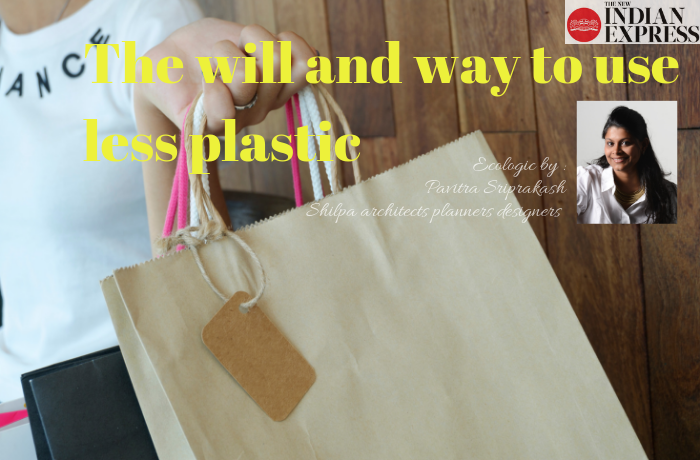21-Aug-2019 : Pavitra Sriprakash, Director and Chief Designer at Shilpa Architects Planners Designers writes a weekly column on Sustainability for The New Indian Express titled “ECOLOGIC”. This week she writes about shifting to the organic lifestyle-discovering zero waste shopping.
Full article below: (Also available at The New Indian Express Website)
The will and way to use less plastic
We have been grossly underestimating our usage of plastic. Only 14 of India’s 35 regional Pollution Control Boards have filed information on plastic waste generation in 2017-18. Thus, the estimates of plastic waste generated does not reflect the situation in more than 60 per cent of India’s states and union territories. Meanwhile, the problem of plastic litter all over our streets, oceans and cities continues to get worse. Out of our estimated 16.5 million tonnes* of plastic consumed annually** — almost 43 per cent of it consumed is used for single-use packaging material that will mostly find its way into garbage bins. In all, 80 per cent of total plastic produced in India is discarded.
With numbers like these, it is hard to ignore the problems this material has already caused in our lives. A small but effective way to reduce this problem is by each one of us adopting a zero waste lifestyle. While this is daunting for most to even start thinking of, simple steps can help get us there. One such simple step is to focus on what we buy and how we buy it too.
Enter, the new trend of zero-waste grocery stores and supermarkets. These types of stores first started popping up in Europe almost a decade ago in hipster neighbourhoods of Berlin and London. The concept is simple — all products in the store come without any packaging. From vegetables not being shrink-wrapped, to rice and pulses in large jars to unboxed pasta – all of the produce is stored in bulk and shoppers bring their own bottles, jars, cloth bags, containers to fill in and weigh out how much they buy.
For those that do not bring along their containers or bags, there are non-plastic options for packaging available at nominal charges so that a customer can shop on the go as well. Admittedly, shopping at packaging-free supermarkets takes some extra planning. If you are a car-less city dweller you can’t possibly be carrying around glass jars in the off chance that you may need to pop into the supermarket. After the purchase, toting a bulky container of wheat or lentils is much trickier than carrying a plastic bag — making it a difficult and unwieldy proposition in public transport situations.
This is similar to our traditional wholesale rice mandis and mara chekku oil joints — except the variety of products on offer are varied and cover almost all the items one can hope to find in a supermarket. With a growing number of consumers understanding how devastating the effects of plastic can be for the environment there are takers for this idea as it starts making its entry into Indian cities. With an array of products that are still being added, many of these stores source their food locally and organically which is an added bonus.
So, think global and act super local — find that hidden wholesale market in your neighbourhood and go the extra mile. It helps safeguard our own health and that of our planet.
(*16.5 million tonnes = the weight of 35 lakh elephants, which sadly outnumbers the total elephant population on the planet 35X)
(**Source: June 2018 report based on data provided by PlastIndia Foundation)



